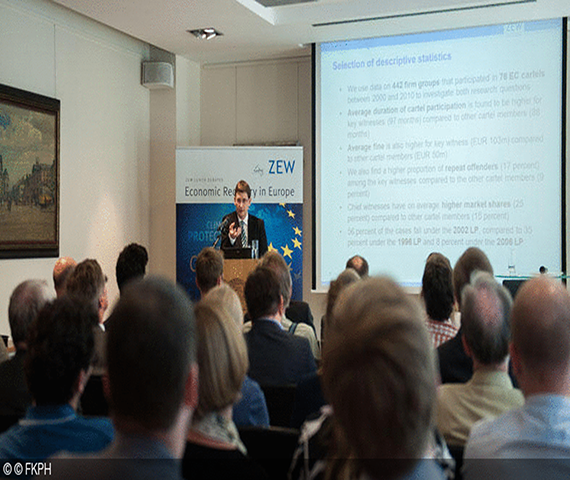ZEW Lunch Debate in Brussels Addresses the Crisis, Income Inequality and Wealth Disparity
ZEW Lunch Debate in Brussels"Are the Fiscal Responses to the Crisis Increasing Income Inequality and Wealth Disparity?" was the topic of the fourth ZEW Lunch Debate in Brussels this year. The event was hosted by the Representation of the State of Baden-Württemberg to the European Union.
After a brief welcome address by the head of the State Representation, Johannes Jung, ZEW President Professor Clemens Fuest introduced the three panelists: Professor Andreas Peichl, head of the Research Group “International Distribution and Redistribution” at ZEW and professor of public economics at the University of Mannheim; Herwig Immervoll, PhD, senior economist and head of “Employment-oriented Social Policies” at the OECD; and Gaetan Nicodème, PhD, head of the “Economic Aspects of Taxation” unit at the European Commission. Some 60 invited guests from the European Commission and the European Parliament as well as industry associations, research institutions and the media attended the event. The Lunch Debate featured three presentations and a subsequent discussion of the panelists with a high level of participation from the audience.
Andreas Peichl started his talk with an overview of government spending and tax revenues during the crisis. The core of his presentation was the analysis of the impact of government spending and austerity policy on inequality. As a key insight he stressed the heterogeneity within the results for different countries. Science-based policy advice, Peichl said, has no “one-size-fits-all” recommendation for fiscal policy in times of crisis. Concluding his presentation, Peichl underscored the need for in-time data availability, especially tax return micro data, in order to assess the impact of the crisis and conduct evidence-based research.
In the second presentation, Herwig Immervoll addressed income inequality patterns that could be identified in OECD countries after economic downturns. Again, the situation in the individual OECD member countries varied largely. Immervoll emphasized that an economic and financial crisis is also a social crisis, increasing the need to support people who lost their job. He pointed out that young employees are hit exceptionally hard by the weak economic situation in many EU countries. In order to reduce the long-term costs of the crisis, he called for active social policy measures, including labour market programmes and social benefits to support unemployed people and the poorest groups of society. Immervoll demanded that a crisis-proof social security scheme characterised by less variable revenue flows replace the ad-hoc emergency measures. Such a scheme, he said, would have a counter-cyclical effect.
Gaetan Nicodème continued along the lines of the previous lectures by adding relevant insights on wealth inequality and the composition of total assets in the euro area. He pointed out that wealth distribution cannot be assessed adequately if the heterogeneity of assets, say financial investments and real estate, is not taken into account. According to Nicodème, both variants of assets are a potential source of income, hence they are of key importance during economic slumps. In addition, he showed the composition of income by different wage levels over the course of the crisis. Nicodème highlighted that although the poorest were hit especially hard in many countries, other parts of the population were affected as well. Again, the results varied profoundly between EU Member States. Nicodème’s presentation confirmed the argument that fiscal responses had heterogeneous effects in the individual countries during the crisis.
After the three presentations, the panelists engaged in a lively debate with the audience. Discussion topics included the recommendations made by the European Commission for fiscal consolidation and government spending, the link between tax progressivity and redistribution, as well as the specific impact of the current crisis on the poorest members of society. The topic of youth unemployment was of particular concern.
Download of the presentation of Herwig Immervoll (as PDF, 1,76 MB)
Download of the presentation of Andreas Peichl (as PDF, 776 KB)
Download of the presentation of Gaëtan Nicodème (as PDF, 387 KB)
